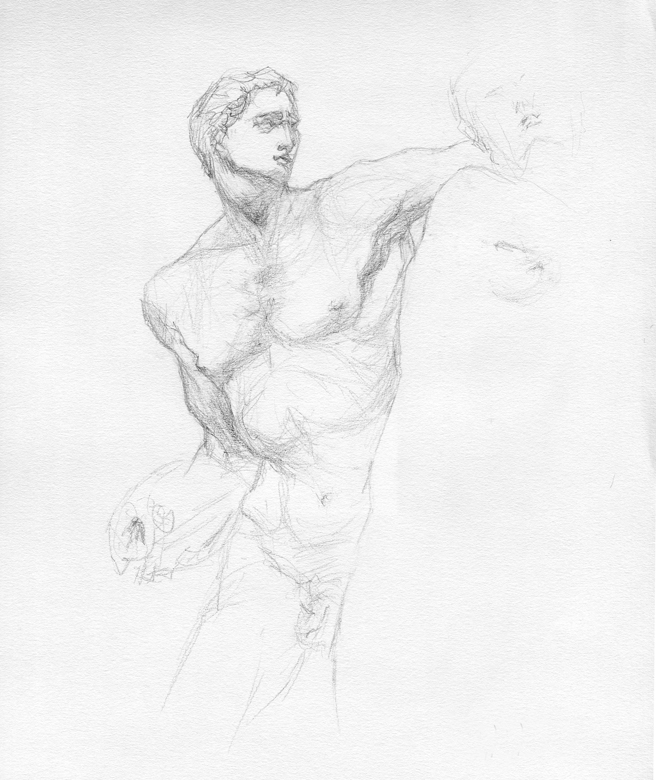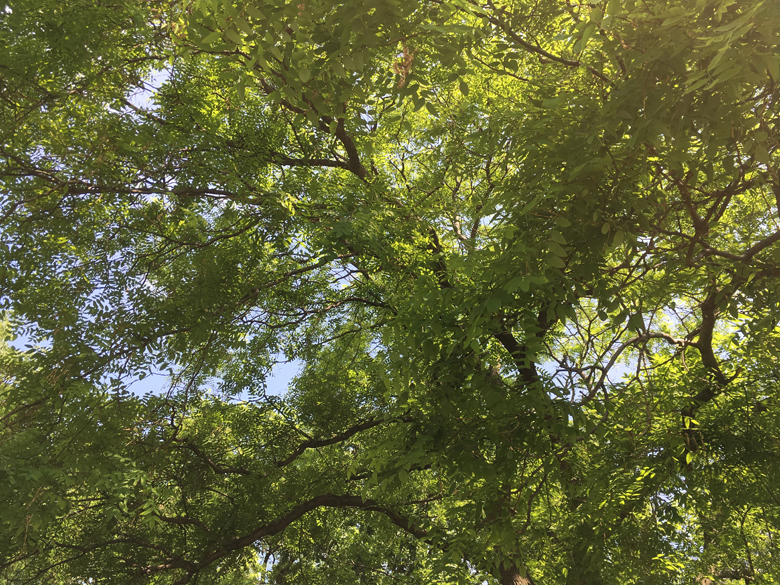CXLII
If the apple is consciousness, the more one eats of it, the wilder one’s garden grows
And in the twining of the twain, Lileva and Adam are born(e) as fruits of the tree in all its knowledge
Common knowledge
Hargitay contemplating the bust of Mansfield
The carrot and the selfie stick
Be a dwarf, but cast a giant’s shadow
Someone in de dinah with Lord Kitchener
The headless bust: Kitchener and Mansfield
Boom contemplating a bust
I was a pallid bust of Pallas for the…
When white folks get arrested, is it a pallid bust?
When wise, just-minded, mathematically-inclined and warlike folks go on a mission, is it a Pallisade? If they overthrow the government, is it a Pallas coup?
An acre and forty mules
In the bowels of the West 4th Street subway station, a Chinese man of late middle years sits bowing with considerable vigor a two-stringed viol, an ehru, held vertically on his left knee. He produces, over the course of the five minutes or so that you’re waiting for the train, an astonishingly discordant medley of songs, including but not limited to Jingle Bells and The Star Spangled Banner. It is the “home of the brave” passage in the latter that you find particularly excruciating, even over a distance of fifty feet or so from its source.
You work hard against a Baudelaire-like impulse to empty your wallet and pockets into the bag at his feet, saying, “Sir, you have defeated me utterly. The contents of my purse is yours. Please be merciful and stop playing – at least for a moment.” Ah, but now his screech is counterpointed with another, this one welcome, as the M-train barrels round the Greenwich Avenue bend and nears the station, its arrival nearly, but not quite drowning out the strains of Red River Valley. Now safely on the train, hearing the robotic voice from above announcing Broadway-Lafayette, you can’t help but wonder about the musician’s intentions.
When you get off at Delancey street, the same yet not-same sound greets you. A Chinese man of middle years sits bowing his erhu. But this fellow’s intonation is smooth and flowing, and the song sounds decidedly “traditional.”
SynapsedChat®
At Penn Station, also known as Penn’s Labyrinth, the escalator tunnel to the trains resembles a metallic vagina with a very long ridge of clitoris along the ceiling.
Along the rail line outside of See-caucus, a water-filled ditch lined with reeds. You gasp. There, nearly amidst the herons, stands Pharaoh’s daughter, bathing. And look, drifting closer, that basket. Will she see it?
I was an exploding grain silo for…
I was a brownfield of successional growth…
Secessional growth. Sometimes the only way.
And tiny acorns from great trees do grow.
Put some intentionality behind that intentionality
I was my own Doppelgänger
Pro-sequent, sub-sequent, con-sequent
In-con-se-quent
shall
It is the tendency of stories to become more interesting
Discovery and Madness
Puttin’ on the shab
It isn’t fun unless you organize it on FB®, do it together, and then tweet about how spontaneous it is-was
Washing his hands at the adjoining sink in the Strand men’s room, a man wearing a ranger hat turns and nearly whacks you with an improbable device he’s carrying – which looks like a wooden yard stick equipped with a pair of sliding metal right angles.
“Sorry,” he says.
“Not at all. What is that?”
“A tree caliper.”
“Ah… are you going to measure the books and find out how wide they once were?” The sound of the dryer drowns you out.
SnapChat®, the French cat picture-posting app
Where is the slot for ambiguity? ; )
Old trees, level distance
Cha(ris)matic: the quality of being an attractive void
PRISTINA, Kosovo — Every Friday, just yards from a statue of Bill Clinton with arm aloft in a cheery wave, hundreds of young bearded men make a show of kneeling to pray on the sidewalk outside an improvised mosque in a former furniture store.
The mosque is one of scores built here with Saudi government money and blamed for spreading Wahhabism – the conservative ideology dominant in Saudi Arabia – in the 17 years since an American-led intervention wrested tiny Kosovo from Serbian oppression.
Since then – much of that time under the watch of American officials – Saudi money and influence have transformed this once-tolerant Muslim society at the hem of Europe into a font of Islamic extremism and a pipeline for jihadists… [Carlotta Gall, “How Kosovo Was Turned Into Fertile Ground for ISIS,” New York Times, May 21, 2016]
Arm aloft in a cheery wave, as if hailing one of the 38,000 bombing missions that NATO, under U.S. leadership, carried out against Serbian forces over the course of ten weeks in early 1999. Perhaps Bubba is signaling to the planes that bombed an Albanian refugee convoy thinking it a Serbian army supply train, or the prison full of Albanians we bombed killing 87 inmates and some guards, oops. Or is he directing the planes toward or away from the Chinese Embassy in Belgrade?
And how exactly do the thousands of pounds of depleted uranium – left over from all those bombs and missile strikes and now irradiating the soil and water table – affect the fertile ground for ISIS, say, or anything else that tries to grow in the Kosovar countryside.
“I’m very PC.”
“Oh, you mean ‘politically correct’?”
“No, past caring.”
Texte-moi!
Looked at as though from outside, appearance packaging emerges as a central and enduring social practice toward which vast amounts of human energy are directed. Though appearance packaging takes diverse forms – say a magazine, a store, a liturgy –these manifestations exhibit an essentially similar structure and function.
In the West, particularly in modernity, even as images detach from their animating ideas, appearance packaging is not merely that which we may come to know, but the means by which things make themselves available to be known. And, increasingly, the packaging itself becomes more complex, and labor and materials intensive, then the “contents.”
Unpackaged, an appearance counts for little. It resists the ascription of value. Value simply slides off the lone appearance and into the fearful void…
A song for occupations!
In the labor of engines and trades and the labor of fields I find the developments,
And the eternal meanings.
Workmen and Workwomen!
Were all educations practical and ornamental well display’d out of me,
what would it amount to?
Were I as the head teacher, charitable proprietor, wise statesman,
what would it amount to?
Were I to you as the boss employing and paying you, would that satisfy you?
The learn’d virtuous, benevolent, and the usual terms
A man like me and never the usual terms.
[this and below from Walt Whitman, “A Song for Occupations,” from Book XV, Leaves of Grass]
What is the distinction between meaning and value?
I was a card-carrying cardiologist…
Shoeing away the orthopedists
Say, how about some vanity to go with those bourgeois values?
Neither a servant nor a master I,
I take no sooner a large price than a small price, I will have my own whoever enjoys me,
I will be even with you and you shall be even with me.
If you stand at work in a shop I stand as nigh as the nighest in the same shop,
If you bestow gifts on your brother or dearest friend I demand as good as your brother or dearest friend,
If your lover, husband, wife, is welcome by day or night, I must be personally as welcome…
Let loose the dogs of language!
It ain’t heavy, it’s my story
If you become degraded, criminal, ill, then I become so for your sake,
If you remember your foolish and outlaw’d deeds, do you think I cannot remember my own foolish and outlaw’d deeds?
If you carouse at the table I carouse at the opposite side of the table,
If you meet some stranger in the streets and love him or her, why I often meet strangers in the street and love them…
Oh, I know why the birdcage sings
It’s the canticle I can’t understand
The cat
The ass
The trophy
I was a canticle of worms for the FBI
Well, I’ll be a Chinese Indian!
I bring what you much need yet always have,
Not money, amours, dress, eating, erudition but as good,
I send no agent or medium, offer no representative of value but offer the value itself…
There is something that comes to one now and perpetually,
It is not what is printed, preach’d discussed, it eludes discussion and print,
It is not to be put in a book, it is not in this book…
Difference-essence, essence-difference: the frantic, and ultimately maddeningly futile search for the what of things in order to determine their why.
Have you reckon’d that the landscape took substance and form that it might be painted in a picture?
Or men and women that they might be written of, and songs sung?
Or the attraction of gravity, and the great laws an harmonious combinations and the fluids of the air, as subjects for the savans?
Or the brown land and the blue sea for maps and charts?
Or the stars to be put in constellations and named fancy names?
Or that the growth of seeds is for agricultural tables, or agriculture itself?
And the malls come tumbling down
It is difference, which, in Aristotle and beyond establishes reason and without necessarily intending to do so undermines the common ground of sense…
…Chinese painters, opening onto a completely different path… paint a landscape, as we are told, ‘emergent-immersing,’ between a ‘there is’ and a ‘there is not’ – when they shroud forms in trails of mist which widens them as it fades them. Apropos of the painting of Dong Yuan, which Mi Fu tells us is superior to all other, ‘the summits of mountains appear and disappear’ (chu-mo), ‘the clouds and mists lighten and darken’ (xian-hui); the shores and islands are ‘veiled and iridescent…
Or of another painting: ‘the structure of mountains is withdrawn and manifest, the summit of trees appears and is buried…’ Far from being one element in the landscape, the mist is the medium through which forms free themselves from their circumscription and gain in ‘spiritual coloration’. Contrary to it being considered that the more forms that emerge, the more beautiful they would be and the more they would exist, it is the alteration of shadow and light, between the poles of differentiation and indifferientiation, or what projects and what absorbs, which reveals the world in its plenitude. [François Jullien, This Strange Idea of the Beautiful, Michael Richardson and Krzysztof Fijalkowski, trans., Seagull Books, 2010. pp. 105-6]
Jullien goes on to quote Fang Xun: ‘When clouds are painted, they cannot resemble water and when water is painted, it cannot resemble clouds.’ There is a strong difference between the two and, even though it is subtle, the apprentice who sets to work cannot allow himself to neglect this principle. ‘Yet once this principle is well assimilated, one will cease to wonder whether [it is] clouds or water: when the brush is applied, if the intentionality [the ‘internal incitation’: yi] regards [it as] a cloud, then [it is] a cloud, and if it regards [it as] water, then [it is] water.’
Difference has no essential status, but remains available – there is specificity of aspect, by which its individuation forms what is sensible, but without it being isolated or compartmentalized. Staying attached to difference, in contrast, would prevent our receptivity from circulating prior to what, in distinguishing, is fatally reinforced by perception when it identifies.
For Shitao also says… that it is in returning to this ‘receptive’ (shou) capacity that the painter functions effectively… In this state, he does not simply deploy the valency of the various components of the landscape, of the mountain or the water, but apprehends their equivalences. Thus the mountain is very different from the sea, but there is an exchange and communication between them: ‘the sea engulfs and vomits, the mountain slopes and rises’ (as if in welcome). They meet through their rhythmic alternation. The mountain (with ‘the succession of its summits and the linking of its cliffs’, ‘its valleys which are hollowed into gorges and deep ravines’ and so on) is like, or rather is equal to, ‘the unfurling of the sea in immense waves at once engulfing and vomiting’ – this is not a ‘soul which the sea manifests’ and yet ‘the mountain can then be superimposed with the sea’ and confirm its capacities.
In the same way, the sea can ‘superimpose itself on the mountain’ and effectively transpose its features – thus in going from ‘the immensity of its waves and the breadth they contain’, ‘from its wild laughter, its mirages, its whales which caper and its dragons which rise up’, and as far as ‘its waves which rise like peaks, its tides like summits’. If this apprehension is attained only from the perspective of one or the other, of the sea or the mountain, each in an exclusive way, this ‘would be detrimental to receptivity’. [ibid. pp. 111-12]


